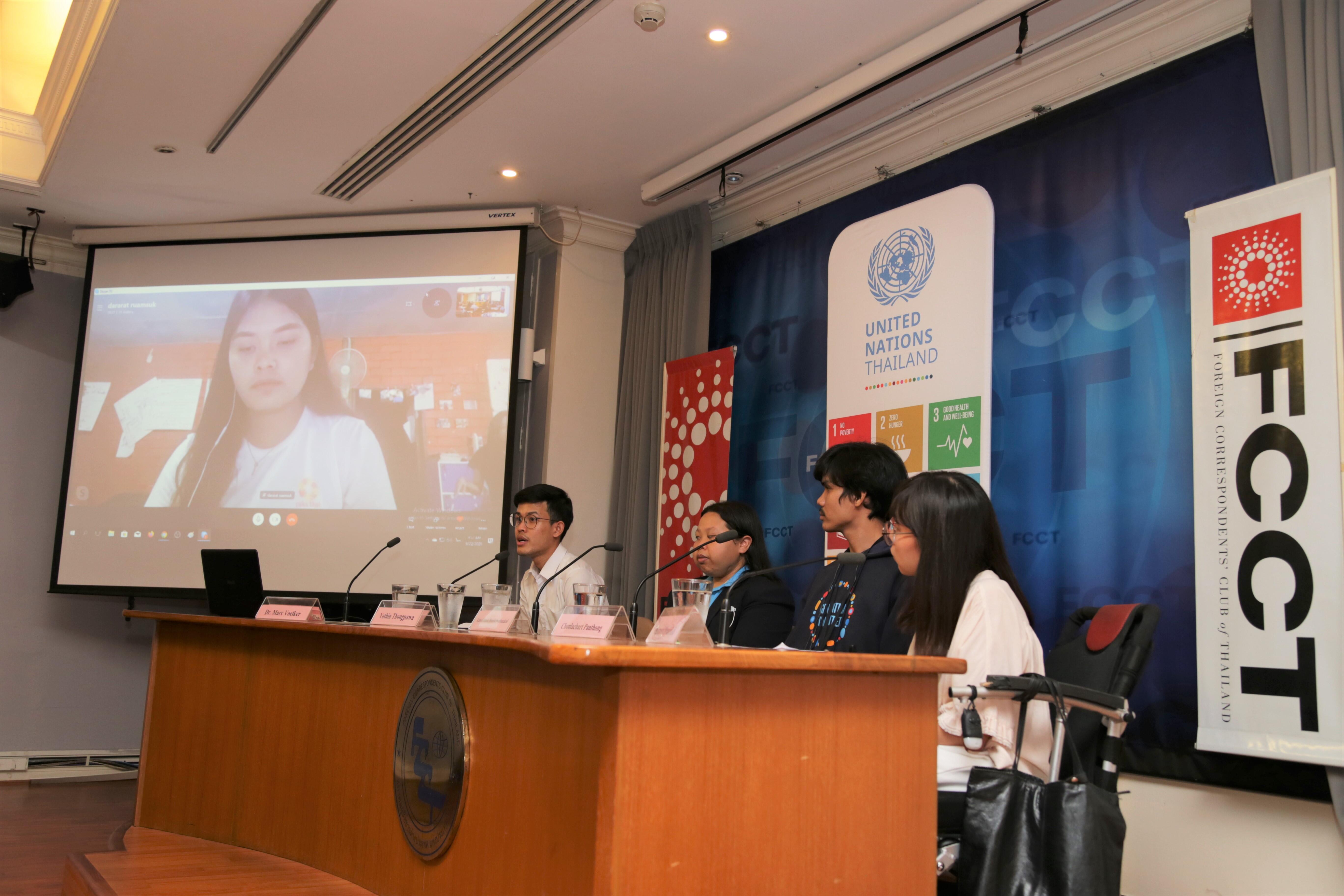Press Release
Vulnerable youth in Thailand falling behind in all key social and economic dimensions due to COVID-19
22 September 2020, Bangkok – A series of six surveys which gathered the voices of 9,000 youth across Thailand, including more than 2,300 youth from vulnerable groups, were conducted by the UN Sub-group on Young People. The surveys underscore that during the COVID-19 pandemic and lockdown many are falling behind in terms of access to jobs, social support, healthcare and education. If no urgent action is taken, COVID-19 will continue to reverse Thailand’s progress in developing its youth and a sustainable future under the 2030 Agenda for Sustainable Development.
Among 1,000 youth from ethnic minority communities who took part in the surveys, about 80 per cent reported that they and their family received no social support during the lockdown, and less than 10 per cent had access to a device for online learning. Almost all youth with disabilities reported lacking learning devices at home. Youth from the three southernmost provinces faced a two-time and four-time increase in unemployment during the pandemic and lockdown, respectively. Moreover, about 41 per cent of the respondents reported that they felt anxious 3-4 days a week.
According to the survey results, 42 per cent of teenage mothers were unable to access healthcare services during the COVID-19 pandemic and lockdown, and 36 per cent were unable to access child healthcare services. During this time, about 39 per cent of LGBTQ youth respondents lacked access to sexual and reproductive health services, such as sex counselling and STI prevention and treatment. About half of the respondents were sexually active during the COVID-19 lockdown, and access to contraception was among their top sexual and reproductive health concerns.
The pandemic has worsened inequality, creating more barriers to the development of a young generation. The impact of COVID-19 on youth’s access to education, sexual and reproductive health services and employment threatens to disrupt the Sustainable Development Goals progress, particularly in reducing poverty, promoting good health and well-being and ensuring quality education.
Gita Sabharwal, the UN Resident Coordinator in Thailand, said “The series of six surveys by the UN Sub-group of young people very well capture the challenges and real needs of young people including vulnerable groups during this pandemic. The results of the surveys echo what we know already: the pandemic is hitting the poorest and most vulnerable people the hardest. If not addressed properly, a new generation of inequalities could emerge, leaving more people even further behind. This is the time for Thailand to recover better, emerge stronger and more equitable than before."
“More than 9,000 young people have made their voices heard through the surveys. The results offer a grim insight into how COVID-19 has accentuated inequities, and these findings should be cause for concern to us all,” said Thomas Davin, UNICEF Representative for Thailand. “While this global pandemic has affected everyone, the already vulnerable and most marginalized are bearing the heaviest brunt. The pandemic has destroyed job prospects, training, as well as education opportunities for many young people. It has also negatively affected their mental wellbeing. We hope that the results of these surveys will help garner momentum for the Government, UN agencies, civil society, the private sector and the young people themselves to come together to reimagine the future of young people in Thailand post COVID-19.”
“The far-reaching impact of the COVID-19 pandemic and lockdown on all youth shows the urgency for Thailand to invest more in the human capital development of all youth and ensure that their rights are protected, including sexual and reproductive health rights, so that all can develop to their full potential and contribute to the sustainable development of Thailand in the future,” said Wassana Im-em, Head of Office at UNFPA Thailand.
The six surveys were conducted between March-July 2020 to assess the impact of COVID-19 on youth, including youth from ethnic minority and stateless groups, young mothers, youth with disabilities, youth from the three southernmost provinces and LGBTQ youth in Thailand. The surveys were conducted online, and therefore they mainly capture the voices of young people who have access to the internet. Youth with disabilities took part in the surveys with assistance. The surveys were conducted under an initiative by the UN Sub-group on Young People chaired by UNFPA and UNICEF together with UN Women, UNDP, UNAIDS, ILO, IOM, UNHCR and UNV.
It is hoped that the results of the surveys will inform policy discussions in all sectors, including through youth advocates and networks, as well as the UN Sub-group members to ensure that youth, especially from the vulnerable groups, are not left behind.
*******************
For more information on the survey results, please visit https://thailand.unfpa.org/en/covid-19-impact-surveys
Listen to young people sharing voices and recommendations for COVID-19 response at https://www.facebook.com/thailand.un/videos/689957371729500/


